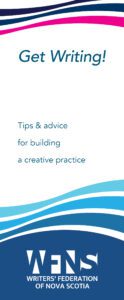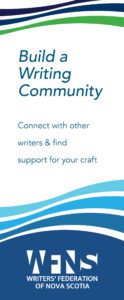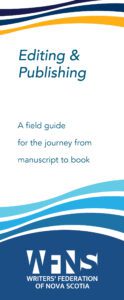Professional Development Guides

Build a Writing Community
Connect with other writers & find support for your craft
Book publishing overviews
Criteria & standards for professional hybrid publishing (proposed by the Independent Book Publishers Association)
So You’ve Written a Book—Now What? [PDF] (by Sal Sawler)
Book promotion
Promoting Your Book with a Small Press [PDF] (by Keanan Byggdin)
Tips for Organizing a Book Launch [PDF] (by WFNS staff)
Quick Guide to Social Media Platforms for Writers [PDF] (by Keanan Byggdin)
Agents
Please note: WFNS staff cannot vet or endorse any particular agent database.
Manuscript Wish List includes self-managed agent and editor profiles.
MS Wishlist collects agents’ social media posts seeking pitches and queries from potential clients.
Query Tracker includes agent information and the ability to organize and keep track of your queries.
Publishers Marketplace (a subscription service) logs approx. 50 new books deals each day and provides listings for book ‘buyers’ (publishers/editors) and ‘sellers’ (agents).
The Writers’ Union of Canada (TWUC) maintains a list of Canadian literary agencies.
Compensation
Compensation standards for editing work: consult Editors Canada or Editors Atlantic
Compensation standards for freelance work: consult the Canadian Freelance Guild
Letter Template for Offers of Unpaid Work or uncompensated publication (by Nicole Burisch)
The Remuneration of Canadian Writers for Literary Works – A Benchmarking Study [PDF] (commissioned by The Writers’ Union of Canada and Union des écrivain(e)s québécois)
Copyright & Legal Info
Editing
10 Things to Know about Working with a Freelance Editor [PDF] (by Tanya Egan Gibson)
Editing Checklist: Determine the type of editing you need [PDF] (by Stacy Innis)
Fiction Editing Checklist [PDF] (adapted by Marianne Ward)
Professional Editing Standards (2016) [PDF] (by Editors Canada)
Pitching & querying
The Elements of a Good Fiction Pitch [PDF] (by Keanan Byggdin)
The Nonfiction Query / Pitch Letter [PDF] (by Whitney Moran)
Writing the Nonfiction Book Proposal [PDF] (by Stephen Kimber)



